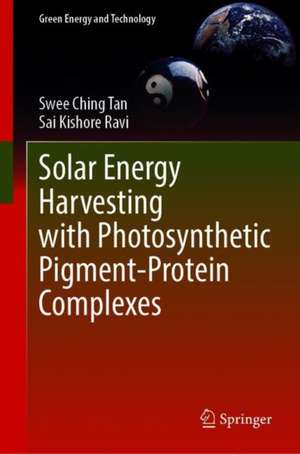Solar Energy Harvesting with Photosynthetic Pigment-Protein Complexes: Green Energy and Technology
Autor Sai Kishore Ravi, Swee Ching Tanen Limba Engleză Hardback – 25 aug 2020
| Toate formatele și edițiile | Preț | Express |
|---|---|---|
| Paperback (1) | 721.51 lei 6-8 săpt. | |
| Springer Nature Singapore – 25 aug 2021 | 721.51 lei 6-8 săpt. | |
| Hardback (1) | 727.31 lei 6-8 săpt. | |
| Springer Nature Singapore – 25 aug 2020 | 727.31 lei 6-8 săpt. |
Din seria Green Energy and Technology
- 18%
 Preț: 943.43 lei
Preț: 943.43 lei - 20%
 Preț: 629.52 lei
Preț: 629.52 lei - 18%
 Preț: 1124.92 lei
Preț: 1124.92 lei - 18%
 Preț: 947.35 lei
Preț: 947.35 lei - 15%
 Preț: 655.92 lei
Preț: 655.92 lei - 18%
 Preț: 957.62 lei
Preț: 957.62 lei - 18%
 Preț: 789.52 lei
Preț: 789.52 lei - 17%
 Preț: 464.56 lei
Preț: 464.56 lei - 15%
 Preț: 645.79 lei
Preț: 645.79 lei - 18%
 Preț: 903.93 lei
Preț: 903.93 lei - 24%
 Preț: 1322.09 lei
Preț: 1322.09 lei - 18%
 Preț: 890.54 lei
Preț: 890.54 lei - 18%
 Preț: 1115.46 lei
Preț: 1115.46 lei - 18%
 Preț: 1117.03 lei
Preț: 1117.03 lei - 18%
 Preț: 949.73 lei
Preț: 949.73 lei - 18%
 Preț: 892.11 lei
Preț: 892.11 lei - 15%
 Preț: 648.24 lei
Preț: 648.24 lei - 18%
 Preț: 997.09 lei
Preț: 997.09 lei - 15%
 Preț: 579.81 lei
Preț: 579.81 lei - 18%
 Preț: 1123.15 lei
Preț: 1123.15 lei - 18%
 Preț: 961.41 lei
Preț: 961.41 lei - 17%
 Preț: 490.23 lei
Preț: 490.23 lei - 18%
 Preț: 904.60 lei
Preț: 904.60 lei - 15%
 Preț: 643.34 lei
Preț: 643.34 lei -
 Preț: 287.91 lei
Preț: 287.91 lei - 24%
 Preț: 634.05 lei
Preț: 634.05 lei -
 Preț: 379.40 lei
Preț: 379.40 lei - 18%
 Preț: 783.20 lei
Preț: 783.20 lei - 18%
 Preț: 956.09 lei
Preț: 956.09 lei - 18%
 Preț: 1394.84 lei
Preț: 1394.84 lei - 18%
 Preț: 1691.57 lei
Preț: 1691.57 lei - 15%
 Preț: 592.61 lei
Preț: 592.61 lei - 18%
 Preț: 952.09 lei
Preț: 952.09 lei - 18%
 Preț: 944.19 lei
Preț: 944.19 lei - 18%
 Preț: 891.33 lei
Preț: 891.33 lei - 18%
 Preț: 1252.44 lei
Preț: 1252.44 lei - 18%
 Preț: 789.52 lei
Preț: 789.52 lei - 20%
 Preț: 566.30 lei
Preț: 566.30 lei - 18%
 Preț: 1112.48 lei
Preț: 1112.48 lei - 18%
 Preț: 1114.24 lei
Preț: 1114.24 lei - 18%
 Preț: 1113.71 lei
Preț: 1113.71 lei - 18%
 Preț: 1011.45 lei
Preț: 1011.45 lei - 24%
 Preț: 590.60 lei
Preț: 590.60 lei - 20%
 Preț: 567.50 lei
Preț: 567.50 lei - 24%
 Preț: 907.50 lei
Preț: 907.50 lei - 18%
 Preț: 952.89 lei
Preț: 952.89 lei
Preț: 727.31 lei
Preț vechi: 886.97 lei
-18% Nou
Puncte Express: 1091
Preț estimativ în valută:
139.19€ • 151.14$ • 116.92£
139.19€ • 151.14$ • 116.92£
Carte tipărită la comandă
Livrare economică 23 aprilie-07 mai
Preluare comenzi: 021 569.72.76
Specificații
ISBN-13: 9789811563324
ISBN-10: 9811563322
Pagini: 172
Ilustrații: IX, 172 p. 76 illus., 75 illus. in color.
Dimensiuni: 155 x 235 mm
Greutate: 0.44 kg
Ediția:1st ed. 2020
Editura: Springer Nature Singapore
Colecția Springer
Seria Green Energy and Technology
Locul publicării:Singapore, Singapore
ISBN-10: 9811563322
Pagini: 172
Ilustrații: IX, 172 p. 76 illus., 75 illus. in color.
Dimensiuni: 155 x 235 mm
Greutate: 0.44 kg
Ediția:1st ed. 2020
Editura: Springer Nature Singapore
Colecția Springer
Seria Green Energy and Technology
Locul publicării:Singapore, Singapore
Cuprins
Introduction.- Biohybrid Photochemical Tandem Cells Integrating Proteins with Complementary Optical Characteristics.- SOlid-State Photo-Bioelectrochemical Devices with Mechanoresponsive electrolytes for Enhanced Photocurrent and Stability.- Photoprotein-Semiconductor Biohybrid Cells for Enhanced Photovoltage.- Prolonged Charge Trapping in Light Harvesting Proteins: Towards Biophotonic Power Cells.- Conclusion.
Textul de pe ultima copertă
This book chronicles a few approaches to constructing biohybrid devices using photosynthetic protein complexes. Can the abundantly available solar energy be tapped to meet our rising energy demands using green and cheap active materials? Exploring nature’s own tiny solar factories, the photosynthetic proteins could hold the key. Photosynthetic pigment-protein complexes found in plants and certain types of bacteria transduce sunlight into biologically useful forms of energy through a photochemical charge separation that has a 100% quantum efficiency. Getting the photoproteins to perform this efficient energy conversion reaction in a semi-artificial setup is central to developing biohybrid solar technologies, a promising green alternative to today’s photovoltaics. This book looks into the existing challenges and opportunities in the field of biohybrid photovoltaics and provides a few prospective methods of enhancing the photocurrent and photovoltage in these devices. The book targets thereadership of students, academics, and industrial practitioners who are interested in alternative solar technologies.
Caracteristici
Provides a crisp overview of the structural and functional aspects of pigment-proteins Summarizes the different ways of integrating proteins in a biohybrid solar cell and their charge transport mechanisms Focusses on new techniques and methods to enhance current and voltage generation Covers design and testing of different device architectures for biohybrid solar energy application
